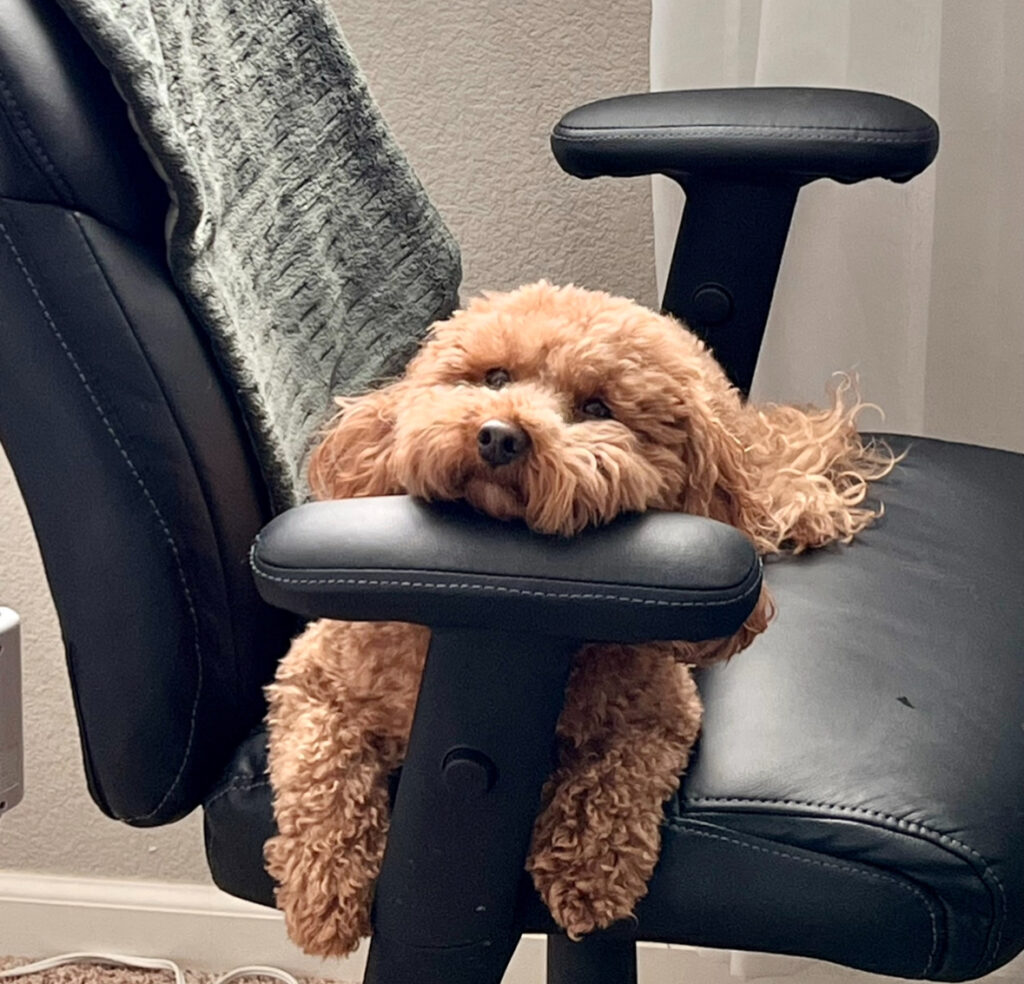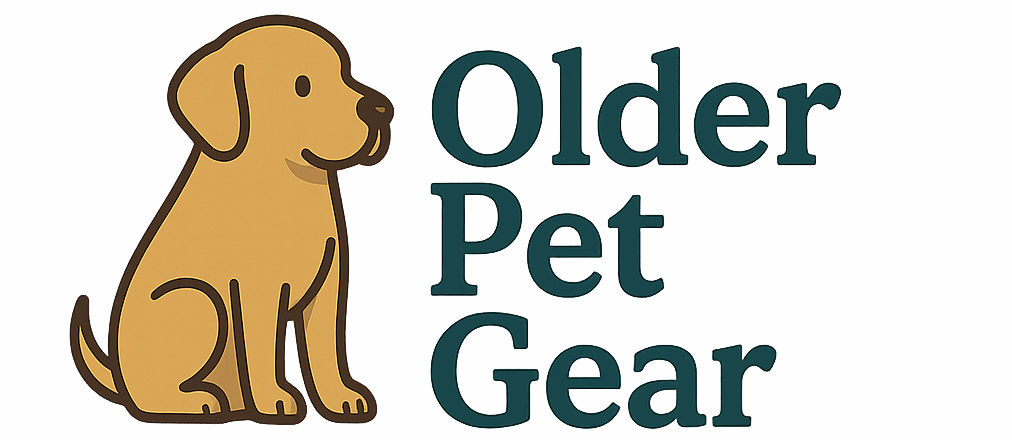
Complete Senior Dog Care Guide: What Your Aging Dog Really Needs
This senior dog care guide shares everything I’ve learned about helping aging dogs live more comfortably, from mobility to sleep to supplements that work. As dogs age, their needs change in ways that aren’t always obvious—until something starts to feel off. Maybe they’re not sleeping as well, avoiding stairs, or seem anxious in situations they used to handle easily.
These signs are often brushed off as “just getting older,” but the truth is, there’s a lot we can do to make a senior dog’s life more comfortable, safe, and enjoyable. Whether your dog is slowing down or just showing signs of aging, this senior dog care guide will walk you through the tools and habits that can make a difference.
This guide brings together everything I’ve learned caring for my own aging dog—from dealing with joint pain and bladder issues to calming nighttime restlessness. If your pup is heading into their golden years, this is your go-to guide for products, habits, and tips that actually help. This senior dog care guide includes real-world advice for keeping your dog happy, safe, and supported through every stage of aging.
As we explore sleep, supplements, and mobility in this senior dog care guide, remember every dog ages differently—and that’s okay.
🐾 Mobility Matters: Helping Senior Dogs Stay Active and Safe
One of the first signs of aging in dogs is reduced mobility. Joint stiffness, arthritis, and back issues can make everyday movement painful—even something as simple as hopping onto the couch or walking across hardwood floors.
If your dog hesitates at stairs or suddenly needs help into the car, it’s time to look at mobility aids.
Helpful Products:
- Best Dog Ramps for Senior Dachshunds
Designed to reduce back strain in breeds prone to spinal issues. - Dog stairs vs. ramps (coming soon)
A side-by-side comparison for different dog sizes and homes.
Tip: Choose ramps or stairs with non-slip surfaces and gentle inclines—especially for dogs with long backs or poor balance.
🛏 Quality Sleep: Choosing Beds That Support Aging Bodies
Senior dogs often wake up stiff or tired, especially if their bed lacks proper support. A lumpy or thin cushion might not be enough to relieve pressure on joints and hips. Orthopedic beds are designed to do just that.
Top Picks:
- Best Orthopedic Dog Beds for Senior Dogs
Real memory foam beds tested for durability, comfort, and ease of cleaning.
Tip: Look for a bed with a low entry point so your dog doesn’t have to lift their legs too high, especially if they have arthritis.
🩼 Supplements That Help
Dogs can’t tell us when something hurts—but their behavior will. If your dog limps, struggles to stand, or seems less eager to play, joint pain might be the issue. The right supplements can reduce inflammation, improve comfort, and support long-term mobility.
There are also supplements that target urinary health, calming, and cognitive support—all of which become more important with age.
Helpful Reviews:
- Best Joint Supplements for Senior Dogs That Work (2025)
Based on what actually made a difference in my own dog’s mobility.
Recognizing Behavior and Health Changes
As dogs age, their behavior changes too. Some become more anxious, others more withdrawn. You might notice them pacing, sleeping more during the day, or becoming less interested in toys and people. These changes aren’t just personality shifts—they often point to pain, confusion, or underlying health issues.
What to Watch For:
- Change in appetite or thirst
- Accidents in the house
- Sudden aggression or clinginess
- Confusion in familiar places
Talk to your vet if you notice changes that seem sudden or extreme. You know your dog best—trust your gut.
😌 Calming Aids for Anxiety and Restlessness
Many older dogs become more sensitive to noise, separation, or even nighttime changes. They might bark more, follow you around, or seem unsettled for no clear reason. This isn’t just “quirky” behavior—it’s often anxiety or discomfort.
Products that helped in my home:
- Proven Gentle Ways to Calm a Nervous Dog (2025)
Includes chews, pressure wraps, and behavioral tips.
If your dog paces at night or can’t settle down, a calming supplement or ThunderShirt may make all the difference—especially when paired with an orthopedic bed or a predictable bedtime routine.
🧼 Bladder and Bathroom Health
Senior dogs often experience bladder issues like incontinence, frequent urination, or urgency. Sometimes it’s an infection. Sometimes it’s just aging. Either way, it’s stressful for both pet and owner.
Personal Experience:
- Zesty Paws Urinary Tract Bites: A Life-Changing Fix for My Dog’s Restless Nights
This one solved the nighttime wakeups in my house when nothing else worked.
Tip: If your dog is peeing more often or seems uncomfortable, don’t wait to act. Even if the vet doesn’t find anything serious, a supplement may still bring relief.
🧾 Daily Routines That Make a Big Difference
Helping your dog age well isn’t just about products—it’s about creating routines that support their changing needs.
Simple Habits That Help:
- Set a consistent feeding and potty schedule
- Keep water accessible at all times
- Limit jumping or slippery surfaces
- Provide soft, quiet spaces to rest
- Keep walks shorter but more frequent
According to the American Kennel Club, older dogs benefit from routines, supportive bedding, and joint-friendly activities.
Final Thoughts
Watching your dog age is emotional—it’s a mix of gratitude, nostalgia, and worry. But senior years don’t have to mean decline. With the right tools, routines, and a little trial and error, your dog can stay comfortable, confident, and happy.
You don’t need to do it all at once. Start with one small change—maybe a better bed or a calming chew. The difference you’ll see in their comfort and behavior will show you it’s worth it.
You don’t need to be perfect. Just present. Just observant. Just kind. I hope this senior dog care guide helps you feel more confident as you support your dog through their golden years.
Bookmark this senior dog care guide or share it with someone who has an aging pet.
Disclosure: This guide contains affiliate links. If you click and make a purchase, I may earn a small commission at no extra cost to you. I only recommend products I personally believe in and would use for my own dog.
